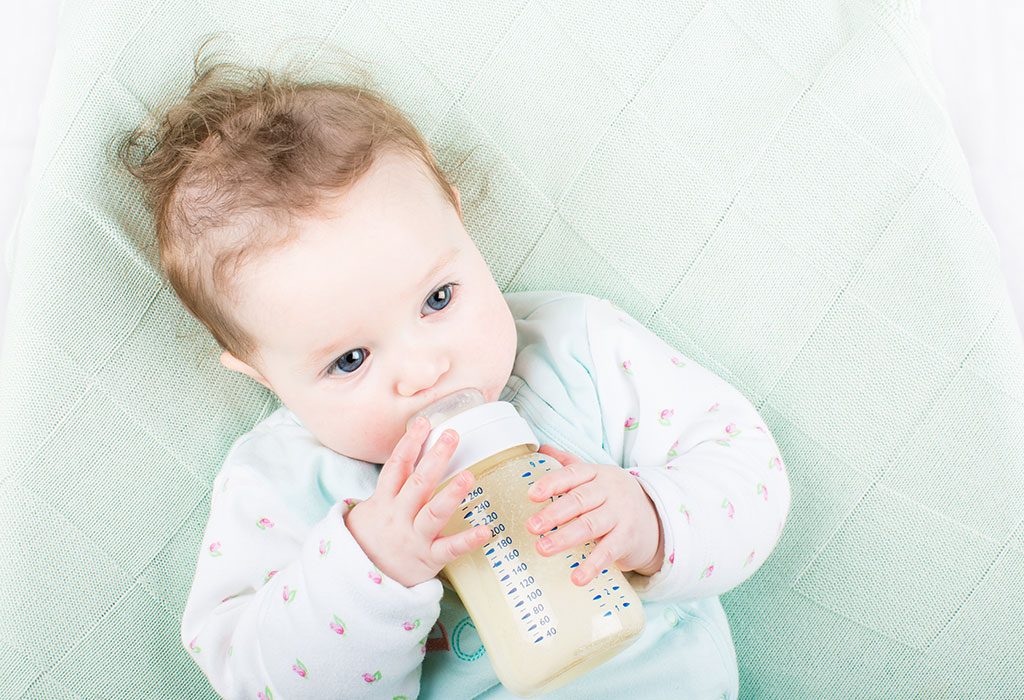In this Article
- How Many Times Does a Breastfed Baby Poop in a Day?
- What Causes Constipation in Breastfed Babies?
- How Long Can a Breastfed Baby Go Without Pooping?
- What Changes Can a Nursing Mother Make to Her Diet to Prevent Constipation in Her Baby?
- What If a Breastfed Baby Is Constipated After Starting Off on Solids?
- When Should You Worry?
- Which Foods Can Cause Constipation in Breastfed Babies?
- What to Do to Prevent Your Baby From Being Constipated
When it comes to breast milk, it is very easy on the baby’s digestive tract and is even considered to be a natural laxative. Breastfed babies, therefore, tend to pass stools more often than formula-fed babies in the first few days after birth. However, after 3 to 6 weeks, breastfed babies tend to have fewer bowel movements (probably 1 or 2 per week) than formula-fed babies. If you’re breastfeeding your baby and notice fewer bowel movements, it doesn’t necessarily mean that he’s constipated, unless his stools are hard and pellet-like and he’s struggling to pass them. In this article, we will be covering the causes of constipation in breastfed babies and how it can be prevented.
How Many Times Does a Breastfed Baby Poop in a Day?
Breast milk is the perfect food for babies. In most cases, the breast milk that a baby consumes gets completely absorbed during the process of digestion. Therefore, it’s possible that breastfed babies may not have a bowel movement for 5 to 6 days. However, it is said that it’s not healthy for babies to go without passing stools for too long. It may signify that the breast milk which assists gut function is not doing its work properly. Normally, babies may poop after every feed, that is, around 8 to 10 times a day. At times, some babies may poop just 1 to 2 times a day which is also normal.
What Causes Constipation in Breastfed Babies?
Babies who are exclusively breastfed very rarely get constipated. However, the following can be a few causes for constipation among babies.
1. Lack of Fibre in the Baby’s Diet
Constipation usually occurs when, along with breastfeeding, babies are given solid foods like rice cereals, carrots, wheat or nuts which do not contain fibre. Due to the lack of fibrous food in a baby’s diet, there is no roughage. This, in turn, leads to a lack of bulk in the baby’s stool, preventing it from passing quickly through the intestines.
2. Dehydration
When a baby suffers from health problems like colds, cough, throat infections, or teething problems, the water content in the baby’s body reduces, resulting in dehydration This can cause constipation.
3. Drinking Formula Milk
At times, in order to compensate for less or no breast milk, mothers feed infants formula milk, which can also lead to constipation. Formula milk is harder for the baby’s body to digest than breast milk, which is why it may cause the poop to be very firm and bulky; using a lot of formula powder adds to this problem. A baby with a milk protein allergy will also suffer from constipation when given formula milk.

4. Unfavourable Weather Conditions
Hot and humid weather may cause babies to sweat a lot, leading to dehydration. Therefore, the lack of water content in the baby’s body can cause constipation.
5. Mother’s Diet and Eating Habits
A baby’s bowel movements sometimes also depend on the eating habits of the mother. The diet of the mother can determine the health of the baby. If the mother’s diet lacks fibre and has excess iron content, her baby may suffer from constipation. Therefore, it is imperative for a nursing mother to eat food which is low in iron. Nursing mothers, in particular, are advised to eat prunes, pears, peaches, and plums.
6. Small Rectal Opening
At times, a small rectal opening will make it difficult for the baby to pass stools. Generally, this condition may need medical intervention, so consulting a paediatrician becomes necessary.
How Long Can a Breastfed Baby Go Without Pooping?
Breast milk is a complete meal in itself for babies. At times, all of it is easily digested by the baby leaving no waste to be eliminated. Therefore, it has been seen that some babies can go without any bowel movement for as long as 2 weeks. Then there are some babies who may take a week to pass stools. Some may poop after every feed and some may do so once in 2 to 3 days time. According to medical practitioners, all of this is normal if the stools are soft and there are no signs of discomfort in the baby.
What Changes Can a Nursing Mother Make to Her Diet to Prevent Constipation in Her Baby?
Nursing mothers should make these alterations to their daily diet in order to avoid constipation in their breastfeeding babies.
- In case you see that your infant has cow’s milk protein intolerance, you must avoid dairy items like cream, yoghurt, butter, ghee, and cottage cheese in your diet. Always remember to read about the ingredients on the labels of the foods you buy.
- If you drink caffeine-rich beverages like coffee, tea, or carbonated drinks, make sure you drink those in moderation.
- Foods which cause gas and bloating need to be avoided.
- Include more fibre-rich foods (such as fruits, vegetables, beans and legumes, whole-grain foods, and so on) and fluids in your diet.
- Make the four Ps (prunes, peaches, plums, and pears) a part of your everyday diet.

What If a Breastfed Baby Is Constipated After Starting Off on Solids?
Many babies get constipated after solids are introduced into their diet. This may be due to a non-fibrous or iron-rich diet which usually causes constipation. Therefore, measures should be taken to stop or reduce the intake of such food. Babies should be given more fluids, especially breast milk to combat constipation. Depending on a paediatrician’s advice and recommended dosage, prune juice can also be given as it acts as a stool softener.
When Should You Worry?
There can be times when your baby can go without pooping for days. However, watch out for signs of constipation such as firm and compact stools, which may or may not have blood in it. Also, if your baby has no bowel movements for days, is vomiting and has a bloated stomach, he might be suffering from constipation. Such a condition can also make the baby cranky and restless. In case you see any of these symptoms, you should immediately consult a doctor.
Which Foods Can Cause Constipation in Breastfed Babies?
Non-fibrous food such as rice or wheat cereal, carrots, formula milk, and bananas can cause constipation in breastfeeding babies. Such infants (if over the age of one) should be given lots of fluids like water and juices of prunes, peaches, and plums, all supplemented by breast milk.
What to Do to Prevent Your Baby From Being Constipated
Here are a few tips you can try:
- Dehydration can lead to a serious case of constipation in infants. Therefore, keep your baby hydrated through breast milk, water, and fruit juices.
- If your baby has just started with solid foods, make sure to give him enough of fibrous foods such as whole-grain cereals/bread, pulses, beans, etc.
- Help your baby exercise to stimulate his bowel movements – the cycling exercise, which will have your baby on his back while you move his legs to and fro in a cycling motion, is quite effective.
- Massaging your baby’s belly gently can ease constipation.
- If the doctor gives you the go-ahead, include prune juice in your baby’s everyday diet in order to soften his stools.
Constipation is a serious and painful condition, which, if not treated in time, can lead to serious health issues. However, it should be kept in mind that irregular bowel movements in your baby do not mean he is constipated. But if he’s having trouble passing stools is and thoroughly straining himself, a doctor should be consulted immediately.









